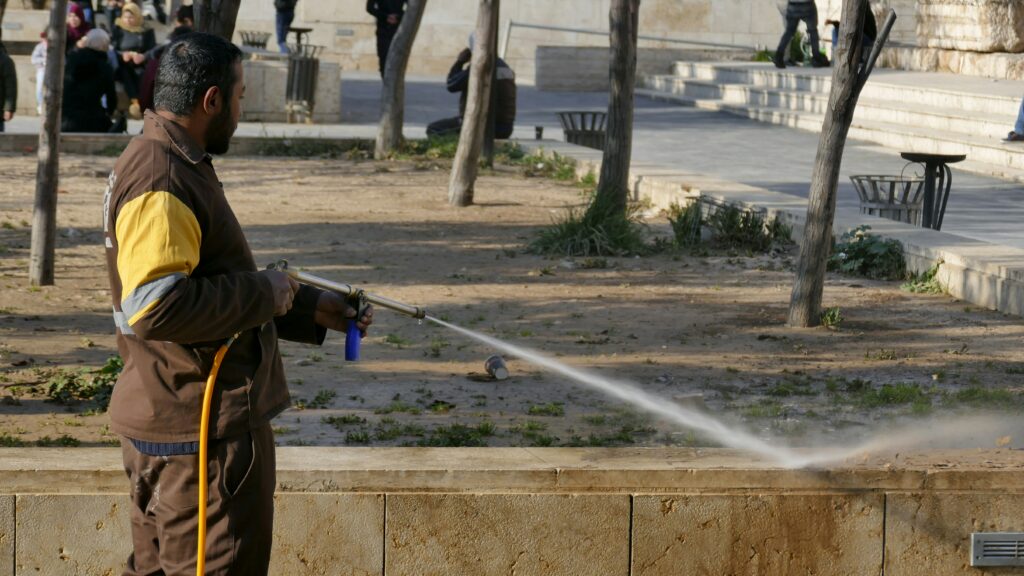Key Takeaways
- Regular pressure washing can extend the lifespan of your home’s exterior.
- It effectively prevents and mitigates mold, mildew, and other contaminants.
- Pressure washing can enhance your property’s curb appeal and potentially increase its value.
Understanding Pressure Washing
Pressure washing is a method of cleaning surfaces using a high-pressure stream of water, which is highly effective at removing accumulated grime, stains, and even biological materials like moss and algae. This technique is often employed for exterior surfaces such as driveways, sidewalks, decks, and house sidings, where the high pressure can dislodge built-up dirt and particulate matter that regular cleaning methods might miss. By using a mix of water pressure and sometimes environmentally friendly cleaning solutions, pressure washing effectively rejuvenates surfaces, maintaining their cleanliness and integrity without resorting to harsh chemicals that can harm the environment.
Why Pressure Washing Is Essential
Maintaining a clean exterior through pressure washing and gutter cleaning is not only visually pleasing but also crucial for prolonging the structural integrity of your home. Exteriors naturally build up layers of dirt and debris over time, which can trap moisture and cause more subtle but serious damage underneath. For example, persistent grime can foster mold growth, which can progressively erode materials and cause structural issues. Regular pressure washing helps mitigate these risks by breaking down and washing away contaminants before they can cause damage. By doing so, you shield your home from potential long-term damage and prevent costly repairs that might arise if these issues were allowed to persist.
Extending the Lifespan of Exterior Surfaces
Environmental exposure’s effects provide various issues for various construction materials, including vinyl, brick, and wood. Wood might swell and rot with prolonged moisture exposure unless properly maintained; brick and concrete can suffer from moss and algae growth that permeates their porous surfaces, while vinyl siding can stain from constant exposure to pollutants and biological growth. Because pressure washing eliminates impurities that could hasten deterioration, it is essential to preserve the integrity of these materials. Consistent cleaning routines help ensure that these surfaces remain durable and less susceptible to damage, significantly extending their lifespan and maintaining the aesthetic value of your property across seasons.
Health Benefits of a Clean Home
A home that is free from dust, mold, mildew, and other allergens offers a healthier living environment for its inhabitants. Mold and mildew are known to exacerbate respiratory conditions, including allergies and asthma, by releasing spores into the air that can be inhaled during routine activities. Effective cleaning methods, like pressure washing, are essential in removing these health hazards. The CDC guidelines on mold prevention emphasize promptly addressing mold and mildew sources to prevent health implications. By regularly cleaning your home exteriors, you are maintaining its appearance and investing in the health and well-being of everyone who resides within it.
Curb Appeal and Property Value
A clean and well-maintained home exterior projects pride of ownership and increases the property’s attractiveness to potential buyers. First impressions are powerful, and a sparkling exterior can be the tipping point in a competitive real estate market. Clean surfaces that reflect light beautifully, as opposed to grimy ones that look lackluster, can significantly improve a buyer’s perception of the property’s value. Moreover, a home that appears well-cared-for is often perceived as being in better structural condition, making it more appealing. According to HGTV’s insights on home improvement, simple enhancements like exterior cleaning can yield high returns on investment, as they enhance overall market appeal without requiring drastic renovations.
Environmentally Friendly Practices
Incorporating eco-friendly practices into pressure washing is increasingly important in promoting both home maintenance and environmental responsibility. By opting for biodegradable cleaning agents and utilizing advanced equipment that minimizes water usage, homeowners can effectively clean their properties without harming local ecosystems. Furthermore, pressure washing itself is a less chemically intensive method of cleaning, relying largely on the mechanical power of water to clean surfaces. This aspect not only ensures that cleaning tasks are accomplished more naturally but also supports broader environmental sustainability goals by reducing reliance on non-biodegradable chemical solutions.
DIY Vs. Professional Services
For homeowners considering pressure washing, choosing between a DIY approach and hiring professional services often comes down to resources, time, and the desired outcome. DIY pressure washing can seem appealing due to lower immediate costs and the satisfaction of handling home maintenance independently. However, it can be risky if not done correctly, posing risks of surface damage or personal injury. Professionals armed with experience and specialized equipment offer thorough cleaning that respects the integrity of the surfaces. They are trained to adjust pressure settings and choose suitable cleaning agents tailored to the specific needs of each material, ensuring optimal results without the associated risks of a novice approach.
Conclusion
Incorporating pressure washing into regular home maintenance routines offers undeniable benefits that extend beyond mere cleanliness. It serves as a barrier against degradation, a booster of aesthetic appeal, and a contributor to environmental health and safety. Whether executed as a DIY project or through professional services, the benefits of maintaining a cleaner, healthier home environment justify the effort, making pressure washing an essential practice for home care. By prioritizing regular cleaning, homeowners can ensure their properties remain vibrant, sustainable, and secure for years to come.


